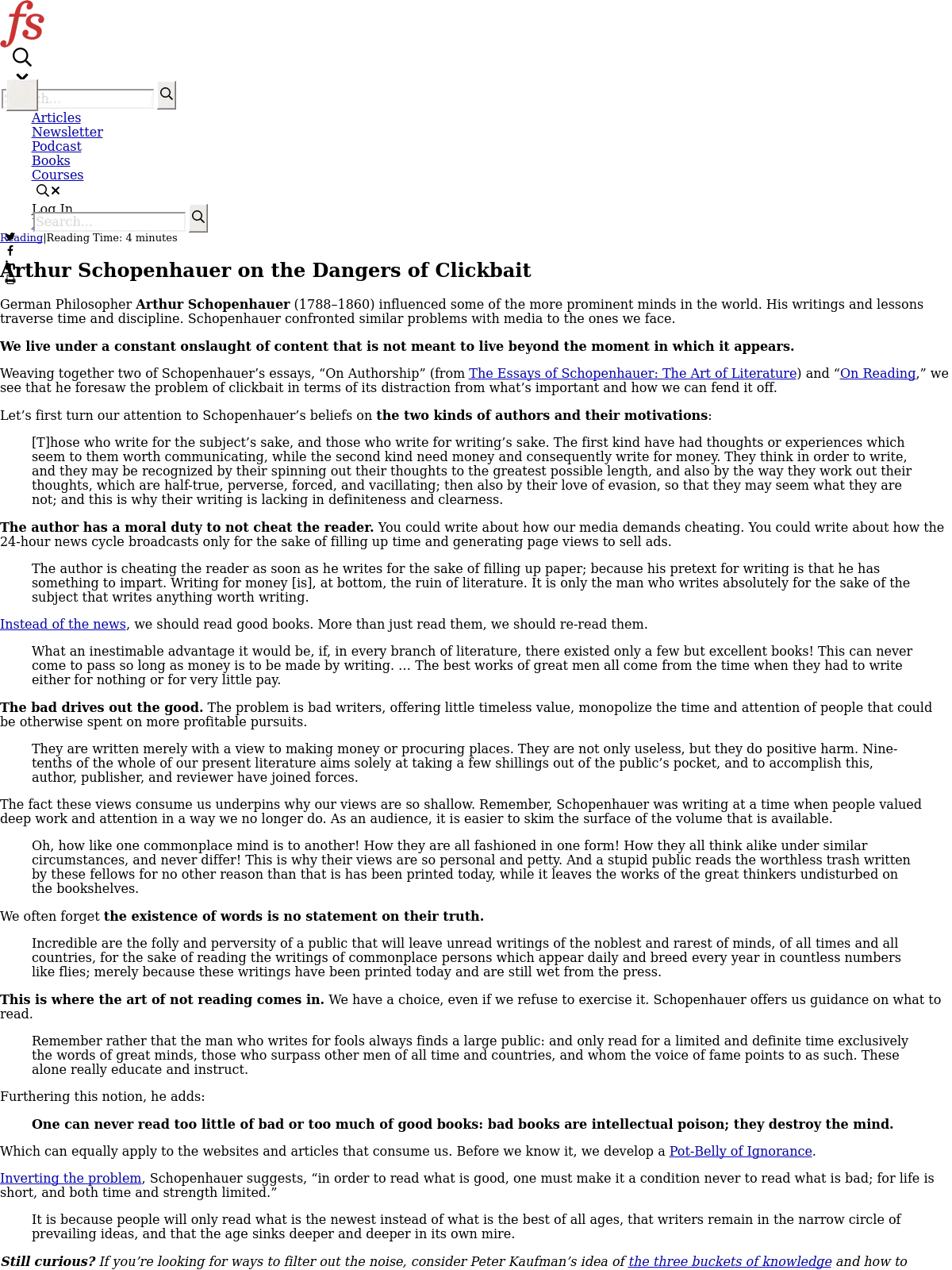Arthur Schopenhauer on the Dangers of Clickbait
Blog: FS - Smart decisions
German Philosopher Arthur Schopenhauer (1788–1860) influenced some of the more prominent minds in the world. His writings and lessons traverse time and discipline. Schopenhauer confronted similar problems with media to the ones we face.
We live under a constant onslaught of content that is not meant to live beyond the moment in which it appears.
Weaving together two of Schopenhauer’s essays, “On Authorship” (from The Essays of Schopenhauer: The Art of Literature) and “On Reading,” we see that he foresaw the problem of clickbait in terms of its distraction from what’s important and how we can fend it off.
Let’s first turn our attention to Schopenhauer’s beliefs on the two kinds of authors and their motivations:
[T]hose who write for the subject’s sake, and those who write for writing’s sake. The first kind have had thoughts or experiences which seem to them worth communicating, while the second kind need money and consequently write for money. They think in order to write, and they may be recognized by their spinning out their thoughts to the greatest possible length, and also by the way they work out their thoughts, which are half-true, perverse, forced, and vacillating; then also by their love of evasion, so that they may seem what they are not; and this is why their writing is lacking in definiteness and clearness.
The author has a moral duty to not cheat the reader. You could write about how our media demands cheating. You could write about how the 24-hour news cycle broadcasts only for the sake of filling up time and generating page views to sell ads.
The author is cheating the reader as soon as he writes for the sake of filling up paper; because his pretext for writing is that he has something to impart. Writing for money [is], at bottom, the ruin of literature. It is only the man who writes absolutely for the sake of the subject that writes anything worth writing.
Instead of the news, we should read good books. More than just read them, we should re-read them.
What an inestimable advantage it would be, if, in every branch of literature, there existed only a few but excellent books! This can never come to pass so long as money is to be made by writing. … The best works of great men all come from the time when they had to write either for nothing or for very little pay.
The bad drives out the good. The problem is bad writers, offering little timeless value, monopolize the time and attention of people that could be otherwise spent on more profitable pursuits.
They are written merely with a view to making money or procuring places. They are not only useless, but they do positive harm. Nine-tenths of the whole of our present literature aims solely at taking a few shillings out of the public’s pocket, and to accomplish this, author, publisher, and reviewer have joined forces.
The fact these views consume us underpins why our views are so shallow. Remember, Schopenhauer was writing at a time when people valued deep work and attention in a way we no longer do. As an audience, it is easier to skim the surface of the volume that is available.
Oh, how like one commonplace mind is to another! How they are all fashioned in one form! How they all think alike under similar circumstances, and never differ! This is why their views are so personal and petty. And a stupid public reads the worthless trash written by these fellows for no other reason than that is has been printed today, while it leaves the works of the great thinkers undisturbed on the bookshelves.
We often forget the existence of words is no statement on their truth.
Incredible are the folly and perversity of a public that will leave unread writings of the noblest and rarest of minds, of all times and all countries, for the sake of reading the writings of commonplace persons which appear daily and breed every year in countless numbers like flies; merely because these writings have been printed today and are still wet from the press.
This is where the art of not reading comes in. We have a choice, even if we refuse to exercise it. Schopenhauer offers us guidance on what to read.
Remember rather that the man who writes for fools always finds a large public: and only read for a limited and definite time exclusively the words of great minds, those who surpass other men of all time and countries, and whom the voice of fame points to as such. These alone really educate and instruct.
Furthering this notion, he adds:
One can never read too little of bad or too much of good books: bad books are intellectual poison; they destroy the mind.
Which can equally apply to the websites and articles that consume us. Before we know it, we develop a Pot-Belly of Ignorance.
Inverting the problem, Schopenhauer suggests, “in order to read what is good, one must make it a condition never to read what is bad; for life is short, and both time and strength limited.”
It is because people will only read what is the newest instead of what is the best of all ages, that writers remain in the narrow circle of prevailing ideas, and that the age sinks deeper and deeper in its own mire.
Still curious? If you’re looking for ways to filter out the noise, consider Peter Kaufman’s idea of the three buckets of knowledge and how to choose your next book.
The post Arthur Schopenhauer on the Dangers of Clickbait appeared first on Farnam Street.
